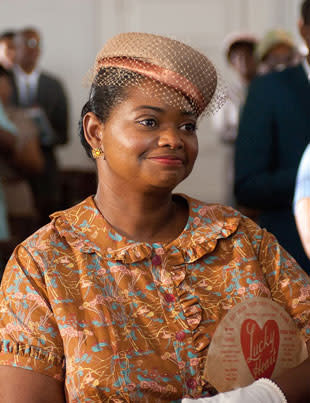 This Week on DVD
This Week on DVDOctavia Spencer Talks About ‘The Help,’ Minny Jackson, and Oscar Buzz

Octavia Spencer is having a very good year. The actor was previously best known for supporting roles in movies like "Drag Me to Hell" and "Being John Malkovich," along with a bunch of television appearances, but this year she is widely expected to get a Best Supporting Actress nomination for her performance in "The Help," which comes out on DVD this week. She plays Minny Jackson, an African-American maid whose sharp tongue gets her into trouble. It's a role that Spencer seems born to play, and indeed she was. Kathyrn Stockett, who wrote the book the movie is based on, was friends with Spencer and wrote the character with her in mind.
Recently, I had a chance to talk to Spencer over the phone about the movie, her character, and that entire Oscar buzz.
Jonathan Crow: This is a big breakout role for you. And there's been a lot of talk about an Oscar nomination for your performance. Do you find yourself thinking about that a lot, or are you able to ignore it?
'The Help' Showtimes and Tickets >>
Octavia Spencer: Well, there is no way really to ignore it. Here is what I will say. It was easier to push it to the side when the movie first came out. Now that it's persisted -- thank God, it's persisted -— it's harder to do that. It is every actor's dream to be recognized with any accolades. And I would be lying if I said anything otherwise. But I am a control freak and I know that this is beyond my control, so the only thing I can do is live each day. I am having a ball.
JC: I saw you with the rest of the cast at the Hollywood Movie Awards earlier this year. You all looked very close.

OS
: Well, I will tell you, Viola [Davis] and I talk every other day. I am either emailing or texting with Emma [Stone] and Jessica Chastain at least once or twice a week. I just saw Bryce [Dallas Howard] last week. Allison Janney is one of my best friends on the planet. I mean, we are a very close-knit group. They are people that I want in my life.
JC: I read that you've known director Tate Taylor for a long time. I mean, you were roommates, right?
OS: Yeah, and our next-door neighbor is the producer, Brunson Green. My relationship with Tate dates back to the summer of 1995, and Brunson I met the winter of 1996. So yeah, it's a very incestuous group.
Learn the Latest about Movies >>
JC: How much of Minny is you?
OS: Well, the part that's me is the part that you see, the physicality. Also I can have a very biting anger, which Kathryn saw and heightened.
I was introduced to Kathryn via Tate while she was formulating the outline for "The Help." We were in New Orleans during the summer and I hate to be hot, and I was 100 pounds overweight, on a diet, and Tate decided it was a good idea to take us on a walking tour of New Orleans. So Kathryn saw me and Tate bickering for about two or three hours, and I think that's how Minny was born.
JC: So she based the character on you?
OS: She took the broad strokes from me -- a short, chubby woman with an attitude, and then she just colored her in even more. But again, that was a very emotionally heightened day. Have you ever done a fast? You know how angry you are when you are hungry.
JC: So how did you prepare to play Minny?
OS: I worked with an acting coach, did a lot of research about spousal abuse or domestic abuse and battered wife syndrome, which was obviously an anachronism. That phrase hadn't even been thought up yet.
But I really did have a problem with the paradox of Minny, being so outwardly bold but yet unable to protect herself in her own home. So I couldn't really play her effectively until I stopped judging her, and the only way to not judge her was to understand her. And that's why I did a lot of research on battered wife syndrome and I did a lot of research about the era.
JC: Period movies always have a lot to say about, not just the period they came from, but the time the movie came out.
OS: Absolutely!
JC: What do you think "The Help" has to say about now?
OS: I think the "The Help" reminds us of our humanity. And it's socially relevant even today. I think you can substitute the plight of the African-Americans and their quest for civil rights with homosexuals wanting the right to marry. Revolutions usually happen when the underserved or underclass find their situation no longer tenable. Look at Occupy Wall Street fighting for the shrinking middle class and poor, you know what I mean?
See Octavia Spencer in this clip from 'The Help':
